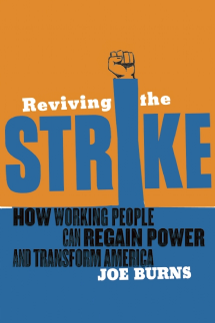
In Reviving the Strike, Joe Burns argues that for organized labor to regain the power it once had, labor unions must revive the production-halting strike. During labor’s heyday, unions regularly and repeatedly utilized the tactic of production-halting strikes to win major gains for workers across the country. In the latter part of the 20th century however, labor laws and judicial decisions rendered the production-halting strike all but impossible. During the same time, the share of unionized workers plummeted and continues to do so. In this fast-paced and well-documented book, Burns makes the case that no other tactic can replace the production-halting strike, and that labor unions must find a way to bring it back, even if that means breaking the law.
Seth Ackerman wrote a fantastic and thorough review of Reviving the Strike for the Jacobin a short while ago. In lieu of such thoroughness, I opt here to discuss just one facet of Burn’s book: his first principle of labor rights. In Chapter 7 of the book, Burns argues that labor activists should rely, both philosophically and rhetorically, on the principle that “labor is not a commodity.” Drawing upon the speeches of notable labor leaders like Samuel Gompers and Walter Reuther, Burns makes the case that a labor movement which accepts the idea that labor is merely a commodity to be bought and sold on the market immediately reduces its role to mere wage-bargaining.
By conceding the commodification of labor, unions implicitly accept the idea that “once workers sell their labor, they have no further interest in the enterprise, as the employer now owns the final product and all profits derived from its sale.” But, according to Burns, this should not be the aim of union organizing. Unions should stand for the principle that workers do have a stake in their workplaces, and that management and owners do not have the only legitimate say in the direction and functioning of any particular enterprise. Under that principle, workers that halt production do so justly: it is their workplace just as much as it is management’s, if not more so.
Further, according to Burns, labor commodification functions as a form of social control. Unlike other commodities — soybeans, lumber, and steel for example — labor consists of the actions of human being with moral importance and lived experiences. The majority of an adult’s waking hours are spent laboring, and if we stand for the principle that labor is merely a commodity to be controlled by its owner, then management and shareholders are free to dominate and control individuals during the majority of their waking lives. Given the profound immorality of such an idea, Burns argues that labor leaders should flatly reject the commodity status of labor, and consequently the idea that “the market should govern every sphere of human activity.”
Outside of procedural justice libertarianism — one of the more jokish schools of political thought in the late 20th century — Burns’ contention that labor commodification is problematic does not seem at all controversial. Robert Nozick, a proponent of free market capitalism, non-ironically stated that the distributive principle of a capitalist system with labor commodification is: “To each according to how much he benefits others who have the resources for benefiting those who benefit them.” Does anyone seriously think this distributive principle is moral?
Unless they also favor redistribution, proponents of free market capitalism necessarily accept the idea that a worker’s well-being should be contingent upon the market value of their labor. But again, when actually pressed to defend that logical consequence of labor commodification, few people seem willing to do so. Large numbers of countries all over the globe have set up massive economic spaces that are completely void of the principles of labor commodification. For instance, in the United States, we have food stamps, Medicare, Medicaid, Social Security, financial support for the disabled, for children, and so on. Some may dislike some of those programs, but very few would actually favor cutting all of them on principle.
The reason they would not favor doing so is because at the most basic level, people reject the principle of labor commodification. People reject the idea that a person’s worth and access to resources and individual well-being should be determined by the market value of the commodities they have to offer, which for many just means their labor. As Claus Offe points out, working people in almost every market economy lash out at and refuse to accept the consequences of labor commodification. They do so by creating unions, constructing welfare states, and instituting forms of income redistribution.
Burns’ view that labor is not a commodity, and that labor unions should always oppose any characterization of labor as such, is brilliant in its simplicity and its scope. When actually pressed very few people accept the idea that a person should be treated the same way that we treat other commodities — something to be bought and sold and remunerated only according to market prices. We do not treat our children, the poor, the elderly, or the disabled that way, and we should not treat anyone else that way. Labor unions have a lot to gain by aligning themselves with the tendency of people in general to reject the idea of labor commodification.